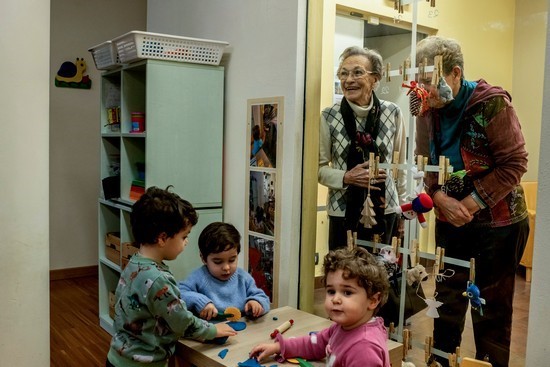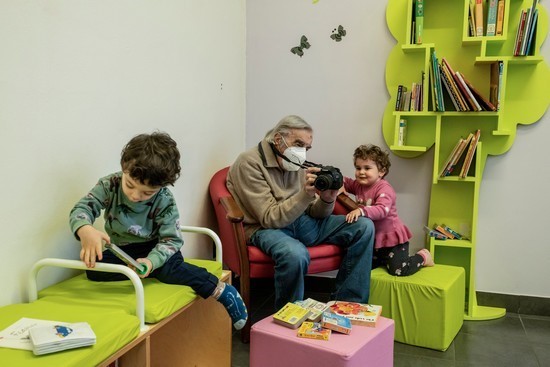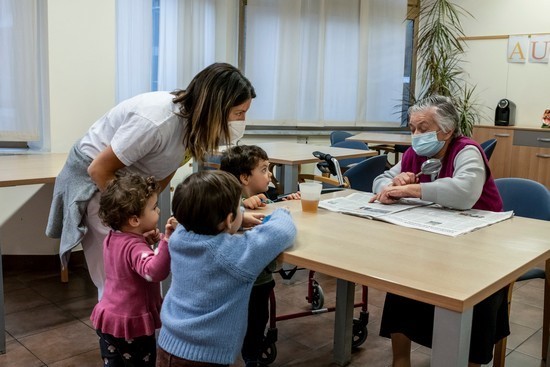PIACENZA, Italy — On one side of a
glass wall, three toddlers in a nursery school flattened play dough with
plastic rolling pins. On the other side, three old women in a nursing home
tapped the pane to get their attention.
اضافة اعلان
“Let’s say hi to the nonni,” the children’s
teacher said before leading them through a door that connected the two rooms.
The children stopped to play with the
magnifying glass of a delighted 89-year-old woman who had been using it to read
obituaries. Then the toddlers, all 2 years old, took an elevator upstairs,
where nursing home residents waited to read them picture books in a small
library.
 The Elderly and Children Together project, an experiment
that seeks to connect the vulnerable at both extremes of life, at a nursing
home in Piacenza, Italy, on December 21, 2022.
The Elderly and Children Together project, an experiment
that seeks to connect the vulnerable at both extremes of life, at a nursing
home in Piacenza, Italy, on December 21, 2022.
“It’s an extraordinary thing,” said one of
the residents, Giacomo Scaramuzza, 100. “People think we are from two different
worlds, but it’s not true. We are in the same world. And maybe I give them
something, too. There is an exchange.”
Piacenza’s Elderly and Children Together,
an experimental project in the country’s most renowned region for childhood
education and elder care, seeks to connect the vulnerable at both extremes of
life. But it also puts Italy’s two existential challenges under one roof.
At the fore of the ‘silver tsunami’Italy’s population is aging and shrinking
at the fastest rate in the West, forcing the country to adapt to a booming
population of the elderly that puts it at the forefront of a global demographic
trend that experts call the “silver tsunami”. But it faces a demographic double
whammy, with a drastically sinking birthrate that is among the lowest in
Europe. Prime Minister Giorgia Meloni has said Italy is “destined to disappear”
unless it changes.
“To care for the old is to care for all of us.”
This month, Meloni’s government approved a
new “Pact for the Third Age”, which she said would lay a foundation for health
and social overhauls for Italy’s exploding population of old people. “They
represent the heart of society, and a patrimony of values, traditions, and
precious wisdom,” said Meloni, adding that the law would prevent
marginalization and the “parking” of elderly in institutions.
“To care for the old is to care for all of
us,” she said.
The overhaul essentially adopted — experts
say nearly wholesale — a measure approved at the end of the previous
administration of Prime Minister Mario Draghi. Critically, it followed Draghi’s
lead in wrapping the legislation into the European Union recovery fund program,
which ensures that it will be enacted.
“This is the acknowledgment that long-term
care is a welfare policy,” said Cristiano Gori, who leads the Pact for a New
Welfare on the Dependent, the umbrella organization that advocated the law.
The new law, he said, will fix a system
that is “a mess”, streamlining and simplifying government healthcare and social
services, and getting local and national government into the growing field of
long-term care. At the same time, it seeks to keep aging Italians in their own
homes and out of institutions. A key innovation, he said, depends on funding by
the Meloni government but would give Italians a choice between unconditional
cash benefits or larger in-kind contributions to be used for public care.
“The main shortcoming is that there is no
money,” Gori said. The hope, he said, is that Meloni’s government, which sold
itself to voters as being “family, family, family”, will make the program a
real priority and fund it. But without more young people to join the workforce
and pay into pension and welfare systems, the whole system is imperiled.
Boosting the birthrateMeloni, who once ran for mayor while
pregnant, is Italy’s first female prime minister, and throughout her career,
she has made raising the country’s perennially low birthrate and helping
working mothers a priority.
 Giacomo Scaramuzza
plays with children in the library of a nursing home in Piacenza, Italy, on
December 21, 2022.
Giacomo Scaramuzza
plays with children in the library of a nursing home in Piacenza, Italy, on
December 21, 2022.
But critics say her “Italians First”
opposition to immigration — she has gone so far as to warn against “ethnic
replacement” — hurts population growth. And Meloni’s government, slowed by
local bureaucratic snags, has already delayed a program to build new nursery
schools financed with 3 billion euros — or about $3.3 billion — in EU recovery
funds.
If Italy does not get serious about
encouraging young families and working women to have children, “it will remain
and forever be a country that gets older”, said Alessandro Rosina, a leading
Italian demographer and an author of a “Demographic History of Italy”.
Without more young people to join the workforce and pay into pension and welfare systems, the whole system is imperiled
The combination of low employment for
women, the fleeing of young professionals and families, little immigration, low
birthrates, and radically increased life expectancy amounted to a demographic
disaster, he said.
Reinvigorating an elderly populationThe reality of the gray new world poses a
make-or-break test for Italy, making it a laboratory for many Western countries
with aging populations, some experts said.
Some of Italy’s regions hope to delay that
demographic time bomb by prolonging the period in which older people can work,
be self-sufficient and contribute, and not be a financial drain on society. The
center in Piacenza has sought to invigorate them with its precious resource of
children. Before COVID sealed the nursing home off, children in the center ate
and even cooked with the older residents. Now things are opening up again.
 Children with
the resident of a day care for the elderly in Piacenza, Italy.
Children with
the resident of a day care for the elderly in Piacenza, Italy.
In November, Meloni, who has roots in
post-Fascist parties, encouraged couples to have children and businesses to
hire women. She later announced a 50 percent increase in the “baby bonus”
checks parents receive a year after a birth and a 50 percent increase in
assistance for three years to families with more than three children.
“We continue to look at today,” Meloni has
said, “not realizing we won’t have a tomorrow.”
If Italy does not get serious about encouraging young families and working women to have children, “it will remain and forever be a country that gets older”
But despite billions of euros earmarked for
nursery schools by the European Union, Italy has delayed the start date on
1,857 nurseries and 333 kindergartens, the majority in Italy’s poorer south. If
Italy fails to start building by the latest deadline, June 2023, it risks
losing the money.
Scaramuzza, the centenarian, said he hoped
some of the new nurseries would also share space with nursing homes, as his
does.
“Not having had children or grandchildren,”
he said, “here, I have a great number of grandchildren.”
Read more Lifestyle
Jordan News







